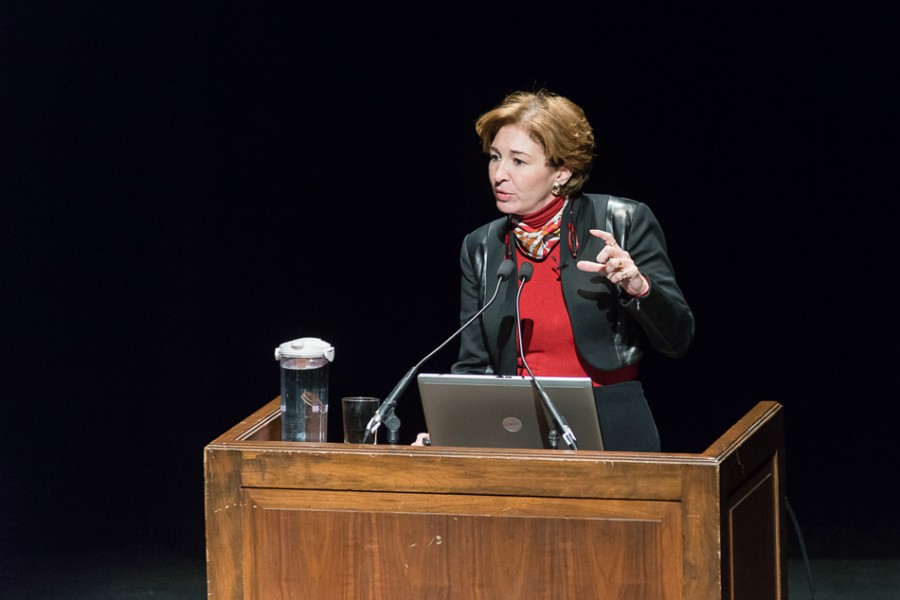Anne-Marie Slaughter talks foreign policy at 25th annual Leopold Lecture
Nathan Richards/Daily Senior Staffer
Anne-Marie Slaughter, former director of policy planning at the U.S. State Department, speaks in Cahn Auditorium about foreign policy crises and how to address them. Slaughter delivered her speech for the 25th annual Richard W. Leopold Lecture, named for a prominent former Northwestern history professor.
November 7, 2014
Former U.S. State Department official Anne-Marie Slaughter discussed on Thursday how Americans understand foreign policy crises as well as what they miss, during the 25th annual Richard W. Leopold Lecture.
Although Slaughter is known for writing one of the most popular article in the history of “The Atlantic,” which covered gender inequality in the workplace, her lecture reflected the entirety of her long career in foreign policy. Slaughter, the president and CEO of the New America Foundation, a Washington think tank, was the first woman to be the director of policy planning in the State Department from 2009 to 2011.
She spoke in Cahn Auditorium about uniting old and new strategies of addressing global conflict.
Slaughter framed her lecture with a discussion of “hotspots and blindspots” in addressing crises. The United States sees the Ukraine crisis as “a tug of war between Russia and the West,” she said, but the United States fails to realize that what Ukrainians are fighting for is good government, regardless of the tool.
The way to correct those errors of thinking is by analyzing these issues in a different way than the typical chessboard mentality of the World War II and Cold War eras, Slaughter said.
“Geopolitics is very important, but it’s only half of foreign policy,” she said. “The biggest change from the 20th century to the 21st century is the rise of the ‘web.’”
Slaughter described this “web” as networks of individuals, corporations and civic and criminal organizations that have the same ability that states do to shape world events.
“There is no hierarchy, there is no one power that is greater than all the others; there are central nodes,” Slaughter said. “The United States, I still think, is the single-most important node in the world, but it is only one of a number of important nodes.”
She evoked the namesake of the lecture series, Richard Leopold, by noting that in his era, he would have adhered to the chessboard mentality. While Slaughter sees a necessary place for this chessboard strategy, the “web” is a crucial addition to our thinking, she said.
Leopold, a prominent history professor at Northwestern from 1948 to 1980, continues to have one of the most loyal student bases at NU, history Prof. Michael Sherry said after the event. Sherry is the Richard W. Leopold Professor of History. More than 10 of Leopold’s past students attended Slaughter’s lecture.
Sherry said he often thinks about how to draw students to the lecture series, which tends to attract an older crowd. By contrasting a traditional way of thinking about foreign policy with a 21st-century strategy, Slaughter was able to connect with younger and older audience members, Sherry said.
“It’s not every speaker who can have that breadth of appeal and those different levels of operating intellectually,” he said.
Weinberg sophomore Ashley Wood said she was skeptical of the idea that the world is moving entirely away from the chessboard approach to foreign policy, but she said she was convinced by Slaughter’s argument that the strategies should be employed simultaneously.
“When you say that both of these things are relevant, that they coexist and you have to think about the world in these two different ways, that makes sense,” Wood said.
Email: [email protected]
Twitter: @juliarebeccaj


